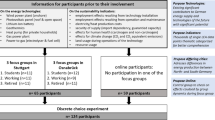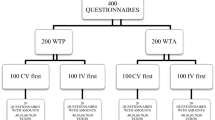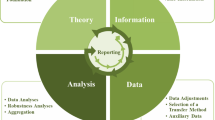Abstract
Estimates of non-market values are valuable for policy makers. However, evidence of the stability of value estimates over long timeframes is limited. That can reduce the usefulness of such values in benefit transfer over time. Furthermore, the values might be affected by the choice of presentation of alternatives (e.g., labeled versus unlabeled). Most of the literature comparing the willingness-to-pay (WTP) estimates lacks an investigation of temporal stability for labeled and unlabeled alternatives. In this case study, the temporal stability of WTP estimates for emissions reduction has been assessed for labeled and unlabeled alternatives. Emissions reduction, certainty of emissions reduction and the options for emissions reductions such as green power, efficient technologies and carbon capture were used to identify respondents’ WTP. The results show that WTP has changed significantly over the course of 10 years. The case study identified that WTP was larger for labeled alternatives than for unlabeled alternatives. The results indicate that WTP estimated from unlabeled alternatives may be more sensitive to temporal effects than labeled alternatives.



Similar content being viewed by others
Notes
The first period of the Kyoto Protocol ran from 2008 to 2012. Australia met and exceeded its first period target of 108% of 1990 emissions levels by 2012. For the second period, 2013–2020, Australia has a target of 99.5% of 1990 emissions levels by 2020 (equivalent to 5% below 2000 emission levels by 2020) (Loynes 2021).
The difference in coefficients with the Williams and Rolfe (2017) paper is due to the modelling approaches: constrained (2017) and unconstrained (this paper) distributions of random parameters.
References
ABS (2020) 5206.0 Australian national accounts: national income, expenditure and product. Retrieved from Canberra: www.abs.gov.au. Accessed 21 Dec 2021
Arrow K, Solow R, Leamer E, Portney PR, Radner R, Schuman H (1993) Report of national oceanic and atmospheric administration panel on the reliability of natural resource damage estimates derived from contingent valuation. Fed Reg 58:4601–4614
Ben-Akiva M, Morikawa T (1990) Estimation of switching models from revealed preferences and stated intentions. Transport Res Part A-Pol Pract 24(6):485–495
Blamey R, Bennett J, Louviere J, Morrison M, Rolfe J (2000) A test of policy labels in environmental choice modeling studies. Ecol Econ 32:269–286
Bliem M, Getzner M, Rodiga-Laßnig P (2012) Temporal stability of individual preferences for river restoration in Austria using a choice experiment. J Environ Manag 103:65–73. https://doi.org/10.1016/j.jenvman.2012.02.029
Boman M, Mattsson L (2012) The hunting value of game in Sweden: have changes occurred over recent decades? Scand J for Res 27(7):669–674
Boman M, Mattsson L, Ericsson G, Kriström B (2011) Moose hunting values in sweden now and two decades ago: the swedish hunters revisited. Environ Resour Econ 50:515–530
Boyle KJ, Kotchen MJ, Smith VK (2017) Deciphering dueling analyses of clean water regulations. Science 358(6359):49. https://doi.org/10.1126/science.aap8023
Brouwer R (2006) Do stated preference methods stand the test of time? A test of the stability of contingent values and models for health risks when facing an extreme event. Ecol Econ 60(2):399–406. https://doi.org/10.1016/j.ecolecon.2006.04.001
Brouwer R, Bateman IJ (2005) Temporal stability and transferability of models of willingness to pay for flood control and wetland conservation. Water Resour Res. https://doi.org/10.1029/2004WR003466
Brouwer R, Logar I, Sheremet O (2017) Choice consistency and preference stability in test-retests of discrete choice experiment and open-ended willingness to pay elicitation formats. Environ Resour Econ 68(3):729–751. https://doi.org/10.1007/s10640-016-0045-z
Carson R, Hanemann W, Kopp R, Krosnick J, Mitchell R, Presser S, Rudd P, Smith K, Conaway M, Martin K (1997) Temporal reliability of estimates from contingent valuation. Land Econ 73(2):151–163
Czajkowski M, Bartczak A, Budziński W, Giergiczny M, Hanley N (2016) Preference and WTP stability for public forest management. Forest Policy Econ 71:11–22. https://doi.org/10.1016/j.forpol.2016.06.027
de Bekker-Grob EW, Hol L, Donkers B, van Dam L, Habbema JDF, van Leerdam ME, Steyerberg EW (2010) Labeled versus unlabeled discrete choice experiments in health economics: an application to colorectal cancer screening. Value Health 13(2):315–323. https://doi.org/10.1111/j.1524-4733.2009.00670.x
de Bekker-Grob EW, Bliemer MCJ, Donkers B, Essink-Bot ML, Korfage IJ, Roobol MJ, Steyerberg EW (2013) Patients’ and urologists’ preferences for prostate cancer treatment: a discrete choice experiment. Br J Cancer 109(3):633–640. https://doi.org/10.1038/bjc.2013.370
Doherty E, Campbell D, Hynes S, Thomas R (2012) Labelling effects in discrete choice experiments. Working Papers 148831, National University of Ireland, Galway, Socio-Economic Marine Research Unit
DoISER (2020) Quarterly update of Australia’s national greenhouse gas inventory: June 2020. Retrieved from https://www.industry.gov.au/publications/national-greenhouse-gas-inventory-june-2020. Accessed 21 Dec 2021
Fimereli E, Mourato S (2013) Assessing the effect of energy technology labels on preferences. J Environ Econ Policy 2(3):245–265. https://doi.org/10.1080/21606544.2013.801183
Hensher D, Louviere J, Swait J (1999) Combining sources of preference data. J Econ 89(1–2):197–221
Hensher D, Shore N, Train K (2004) Households’ willingness to pay for water service attributes. School of Business, The University of Sydney, and Department of Economics, University of California, Berkeley
Hensher D, Rose J, Greene WH (2005a) Applied choice analysis: a primer. Cambridge University Press, Cambridge
Hensher DA, Rose J, Greene WH (2005b) The implications on willingness to pay of respondents ignoring specific attributes. Transportation 32(3):203–222. https://doi.org/10.1007/s11116-004-7613-8
Hensher DA, Rose JM, Li Z (2011) Does the choice model method and/or the data matter? ITLS-WP-11–14. Retrieved from http://hdl.handle.net/2123/19239. Accessed 21 Dec 2021
Hughes L, Stock P, Brailsford L, Alexander D (2018) Icons at risk: climate change threatening Australian tourism. Retrieved from https://www.climatecouncil.org.au/uploads/964cb874391d33dfd85ec959aa4141ff.pdf. Accessed 21 Dec 2021
Jin W, Jiang H, Liu Y, Klampfl E (2017) Do labeled versus unlabeled treatments of alternatives’ names influence stated choice outputs? Results from a mode choice study. PLoS ONE. https://doi.org/10.1371/journal.pone.0178826
Johnston RJ, Rosenberger RS (2010) Methods, trends and controversies in contemporary benefit transfer. J Econ Surv 24(3):479–510. https://doi.org/10.1111/j.1467-6419.2009.00592.x
Jorgensen B, Syme G, Smith L, Bishop B (2004) Random error in willingness to pay measurement: a multiple indicators, latent variable approach to the reliability of contingent values. J Econ Psychol 25:41–59. https://doi.org/10.1016/S0167-4870(02)00167-8
Kassam N, Leser H (2021) Climate poll 2021. Lowy Institute, Sydney, p 14
Koemle D, Yu X (2020) Choice experiments in non-market value analysis: some methodological issues. For Econ Rev 2(1):3–31. https://doi.org/10.1108/FER-04-2020-0005
Kountouris Y, Nakic Z, Sauer J (2012) Is the valuation of water quality sensitive to external shocks? Evidence from political instability in Croatia. Paper presented at the 2012 Annual Meeting, August 12–14, 2012, Seattle, Washington. https://ideas.repec.org/p/ags/aaea12/124705.html. Accessed 21 Dec 2021
Leviston Z, Leitch A, Greenhill M, Leonard R, Walker I (2011) Australians’ views of climate change, CSIRO Report. CSIRO, Canberra, p 22
Lew DK, Wallmo K (2017) Temporal stability of stated preferences for endangered species protection from choice experiments. Ecol Econ 131:87–97. https://doi.org/10.1016/j.ecolecon.2016.08.009
Louviere J, Hensher D, Swait J (2000) Stated choice models—analysis and application. Cambridge University Press, Cambridge
Loynes K (2021) Climate change—the international approach. Retrieved from Parliament of Australia: https://www.aph.gov.au/About_Parliament/Parliamentary_Departments/Parliamentary_Library/pubs/BriefingBook45p/InternationalApproach#:~:text=The%20first%20period%20of%20the,2000%20emission%20levels%20by%202020. Accessed 21 Dec 2021
Matthews Y, Scarpa R, Marsh D (2017) Stability of willingness-to-pay for coastal management: a choice experiment across three time periods. Ecol Econ 138:64–73. https://doi.org/10.1016/j.ecolecon.2017.03.031
McFadden D (1974) Conditional logit analysis of qualitative choice behaviour. In: Zarembka P (ed) Frontiers of econometrics. Academic Press, London, pp 105–142
Merzian R, Quicke A, Bennett E, Campbell R, Swann T (2019) Climate of the Nation 2019. Canberra, The Australia Institute, p 36
Metcalfe PJ, Baker W (2015) Th sensitivity of willingness to pay to an economic downturn. J Environ Econ Policy 4(1):105–121. https://doi.org/10.1080/21606544.2014.978821
Neher C, Duffield J, Bair L, Patterson D, Neher K (2017) Testing the limits of temporal stability: willingness to pay values among grand canyon whitewater boaters across decades. Water Resour Res. https://doi.org/10.1002/2017WR020729
Poe GL, Severance-Lossin EK, Welsh MP (1994) Measuring the difference ( —Y) of simulated distributions: a convolutions approach. Am J Agr Econ 76(4):904–915. https://doi.org/10.2307/1243750
Price J, Dupont D, Adamowicz W (2017) As time goes by: examination of temporal stability across stated preference question formats. Environ Resource Econ. https://doi.org/10.1007/s10640-016-0039-x
RBA (2019) Inflation calculator. Retrieved from https://www.rba.gov.au/calculator/annualDecimal.html
Ritchie H, Roser M (2020) CO2 and greenhouse gas emissions. Published online at OurWorldInData.org. Retrieved from: https://ourworldindata.org/co2-and-other-greenhouse-gas-emissions. Accessed 21 Dec 2021
Rolfe J, Dyack B (2019) Testing temporal stability of recreation values. Ecol Econ 159:75–83. https://doi.org/10.1016/j.ecolecon.2019.01.016
Swait J, Louviere J (1993) The role of the scale parameter in the estimation and comparison of multinomial logit models. J Mark Res 30:305–314
Talberg A, Hui S, Loynes K (2016) Australian climate change policy to 2015: a chronology. Retrieved from Parliamant of Australia: https://www.aph.gov.au/About_Parliament/Parliamentary_Departments/Parliamentary_Library/pubs/rp/rp1516/Climate2015. Accessed 21 Dec 2021
Train K (1998) Recreation demand models with taste differences over people. Land Econ 74(2):230–239
Treasury (2008) Australia’s low pollution future: The economics of climate change mitigation. Summary. Treasury, Australia.
UNFCCC (1997) Kyoto protocol to the United Nations framework convention on climate change adopted at COP3 in Kyoto, Japan, on 11 December 1997
UNFCCC (2015) Adoption of the Paris agreement, 21st conference of the parties, Paris: United Nations. United Nations/Framework Convention on Climate Change. AN OFFICIAL PUBLICATION
Williams G, Rolfe J (2017) Using choice modelling to assess the willingness to pay of Queensland households to reduce greenhouse gas emissions under different management options and uncertainty. Energy Econ 62:302–311
Zandersen M, Termansen M, Jensen FS (2007) Testing benefits transfer of forest recreation values over a twenty-year time horizon. Land Econ 83(3): 412–440. Retrieved from http://le.uwpress.org/content/83/3/412.abstractN2. Accessed 21 Dec 2021
Funding
Funding was provided by the Centre for Tourism and Regional Opportunities (CTRO), CQUniveristy, Australia.
Author information
Authors and Affiliations
Corresponding author
Ethics declarations
Conflict of interest
There is no conflict of interest.
Ethical approval
The Human Research Ethics Committee of CQUniversity—project number 21187.
Additional information
Publisher's Note
Springer Nature remains neutral with regard to jurisdictional claims in published maps and institutional affiliations.
Supplementary Information
Below is the link to the electronic supplementary material.
About this article
Cite this article
Williams, G. Temporal stability of WTP estimates in labeled and unlabeled choice experiment for emissions reduction options, Queensland, Australia. Environ Econ Policy Stud 24, 533–550 (2022). https://doi.org/10.1007/s10018-021-00336-4
Received:
Accepted:
Published:
Issue Date:
DOI: https://doi.org/10.1007/s10018-021-00336-4




